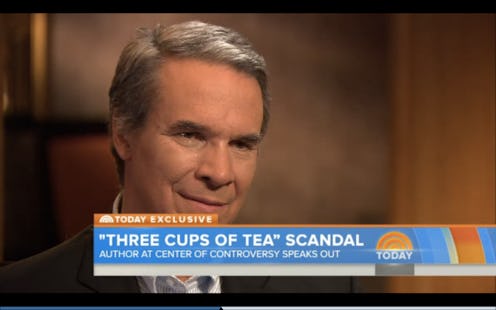Books
What To Make of the 'Three Cups of Tea' Scandal

"In Three Cups of Tea, the first chapter, the first word is 'failure.' I failed in many ways, and it's an important lesson. I'm going to try as hard as I can never to make the same mistakes again,” Greg Mortenson, the discredited author of the nonfiction phenomenon Three Cups of Tea , said Tuesday morning, appearing on NBC's The Today Show to respond to allegations against his book, and his financial misdeeds.
The latter of half of the Aughts were for Greg Mortenson something like a dream. His book Three Cups of Tea, which told of his efforts to bring education to the girls of Afghanistan, became an instant sensation when it was published in 2006 and had a four-year run on the New York Times nonfiction bestseller list. Mortenson was nominated for Nobel Peace Prize in 2009 and 2010. The book was so popular — it sold a million plus copies — it even inspired two editions for young readers.
But then allegations of untruthfulness and financial mismanagement began, with Jon Krakauer’s article “Three Cups of Deceit.” The author of Into the Wild and Into Thin Air, who had donated $17,000 to Mortenson’s efforts, slammed the author for peddling fiction as nonfiction, much in the way A Million Little Pieces had. Then the Montana attorney general found that Mortenson had inappropriately used funds from his Central Asia Institute foundation, and was ordered to pay back $1 million.
To the allegations that his book was fiction and not fact, Mortenson told Tom Brokaw, who interviewed Mortenson for Tuesday morning's Today Show appearance, “The stories happened, but not always in the sequence or the timing. ” (This is similar to what he said back in 2011 when charges of fictionalization arose.)
And when Brokaw pushed him on whether or not he thought what he was doing was wrong at the time, Mortenson said: “There were alarms, Tom. I didn’t listen to them.”
And, in an unexpected turn on the segment, the embattled author thanked his accusers for their efforts to debunk his story. “In maybe a strange, ironic way, I’d like to thank NBC and Jon Krakauer because, had they not brought these issues up, we could have gotten into more serious problems.” (It should be noted that The Today Show is a NBC program.)
On The Today Show this morning, Mortenson seemed repentant, though perhaps like he doesn’t truly accept that he has done something wrong. When explaining his actions, he said that he goes through life acting on what his heart tells him, and yet, it seems strange he didn’t listen to it fully — he believed so strongly in his work in Afghanistan that it stifled, or maybe even justified ignoring, warning signals. Passion is a good thing; it can lead you to help others, bring education to a world that sorely lacks it, but it seems like the cloudiness of passion causes real problems, like it has for Mortenson.
So should we forgive him? This is, of course, up to everyone to decide for themselves, but I think I do. But the question of forgiveness doesn’t feel like most important thing at play here. Mortenson’s story seems to be a tale with a moral warning of the perils of passion, how it can lead you to act in ways that justify the means.
